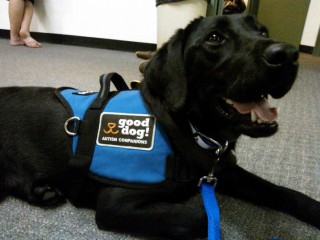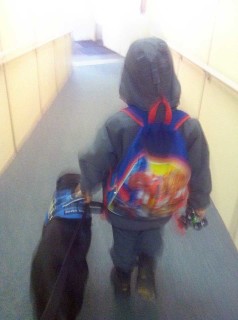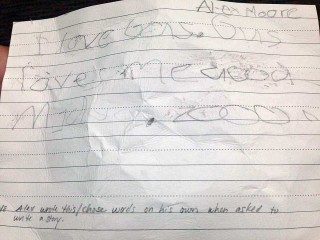When talking to a parent of an autistic child there is always that moment. I have heard it many times and it is heart-wrenching. The parent tells the story of their sons (or daughters) first step, their first word… their first trip to the zoo. It all sounds so familiar and innocent. But then there is a pause… no matter how many times they tell this story, they still choke up at this moment. The next sentence is the hardest thing the parent has ever had to say. They struggle to hold back tears and their breath goes short. The story of typical childhood is about to end. “Then…” they say, with one last pause, “then, he just stopped talking.” It’s the moment when everything changed.
For Victoria and Josh, this moment came when their son Alex was two years old. The doctors in their remote Alaskan town did not have the resources to diagnose the cause of Alex’s silence. They told them it was a phase and he’d grow out of it. But months later, after flying out to see multiple specialists, the official diagnosis was reached. Alex was autistic. And it would be a lifelong disability.
 Alex has outbursts. Alex does not always follow directions. Alex can sometimes seem out of control. In high stimulus settings he can become overwhelmed and begin kick-filled tantrums, accompanied with screaming and crying, as his mom physically removes him from the source of his stress. When Alex was three, onlookers would give Victoria a sympathetic eye. But as Alex got older, the looks became different.
Alex has outbursts. Alex does not always follow directions. Alex can sometimes seem out of control. In high stimulus settings he can become overwhelmed and begin kick-filled tantrums, accompanied with screaming and crying, as his mom physically removes him from the source of his stress. When Alex was three, onlookers would give Victoria a sympathetic eye. But as Alex got older, the looks became different.
Then came Gus.
Gus was a bit small for a black lab. And at only one-year-old, he still had a lot of puppy left in him. But his blue service dog vest somehow made him look older. He was trained specifically to work with Alex. He was to be Alex’s friend, his guide and his connection to the outside world.
Gus was introduced to Alex’s school during a school assembly. First Alex’s mom introduced herself and talked briefly about Alex’s disability. (Everyone at school knows Alex). Then Tim Houweling, Gus’s trainer, spoke. He explained to the children that Alex and Gus had something in common.  They were both nonverbal. And that this gave them a special connection. He also told the children that Gus was a service dog. He was there to do a job and if they wanted to pet Gus they needed to get permission from Alex.
They were both nonverbal. And that this gave them a special connection. He also told the children that Gus was a service dog. He was there to do a job and if they wanted to pet Gus they needed to get permission from Alex.
That day at lunch, Alex was the most popular kid at the table. It was obvious that Alex’s relationship with his classmates had changed and would never be the same again.
What does an autism service dog do? Well, it is different in every situation. During the lighting of the Christmas tree at the local library, normally a high stress situation for Alex, Victoria looked over and saw Gus literally sitting on Alex’s feet, grounding him to the floor. In the middle of the night, if Alex’s blood sugar gets low (Alex is diabetic), Gus will start barking until someone wakes up. When Alex was in the school Christmas concert, Gus was lying at his feet (wearing reindeer antlers). Alex had never made it through a concert without an outburst. Victoria finally got to see her son participate in a school performance.
Alex and Gus are inseparable. They jump on the bed together, they steal food from the fridge together and they run down the school hallways together. For Victoria, it can sometimes seem like she now has two children to look after. But when the inevitable public tantrum erupts, she puts Gus’ harness in Alex’s hand and lets Gus lead Alex out of the room. And nobody looks twice.
 What does Alex think of all this? Well, that is not an easy question to answer. Alex is in the middle of the autism spectrum. He can say a few words and phrases like, “no”, “good” and “it’s OK”. He is also learning how to write. For his second grade writing assignment Alex wrote his first ever sentence – two of them, actually. It was his first communication to the outside world since he was two years old. It reads, “I love Gus. Gus loves me.”
What does Alex think of all this? Well, that is not an easy question to answer. Alex is in the middle of the autism spectrum. He can say a few words and phrases like, “no”, “good” and “it’s OK”. He is also learning how to write. For his second grade writing assignment Alex wrote his first ever sentence – two of them, actually. It was his first communication to the outside world since he was two years old. It reads, “I love Gus. Gus loves me.”
A Noble Paws Note: We look forward to Alex and Gus visiting us at our Fairbanks facility during the 2014-15 season.





